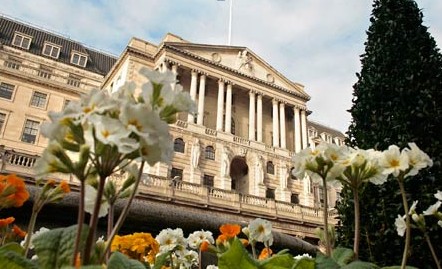考研阅读精选:国际银行监管机构呼吁全球范围内的利率提高
来源:新东方在线
发布时间:2016-12-19
『实施紧缩的货币政策才能抑制通货膨胀,规避金融风险。』
International banking regulator calls for rates to be raised worldwide
国际银行监管机构呼吁全球范围内的利率提高
June 26th 2011 | From The Guardian

CENTRAL banks around the world must raise interest rates soon to bring inflation under control, international regulators have warned.
The Bank for International Settlements (BIS) – the central bank for central bankers – said, in its annual report published on Sunday, that the era of loose monetary policy must end.
"Tighter global monetary policy is needed in order to contain inflation pressures and ward off financial stability risks," the BIS said, adding that rates may need to be raised more rapidly than after previous recessions.
It levied particular criticism at the Bank of England's monetary policy committee (MPC), which has maintained UK interest rates at their current record low of 0.5% since March 2009.
"In the United Kingdom, CPI inflation had exceeded the Bank of England's 2% target since December 2009, reaching a peak of 4.5% in April 2011. As yet, there has been no move by the MPC, but one wonders how long its current policy can be sustained," the BIS said.
City economists increasingly believe the MPC will resist raising interest rates during 2011.
The BIS acknowledged that "policymakers and households have virtually no room for manoeuvre" because of the unsustainably high levels of debts run up by both countries and individuals.However, it continued: "All financial crises, especially those generated by a credit-fuelled property price boom, leave long-lasting wreckage. But we must guard against policies that would slow the inevitable adjustment. The sooner that advanced economies abandon the leverage-led growth that precipitated the Great Recession, the sooner they will shed the destabilising debt accumulated during the last decade and return to sustainable growth. The time for public and private consolidation is now.
"The logical conclusion is that current monetary policy settings are inconsistent with price stability."
The BIS is also clear that the overly indebted countries in the eurozone need to tackle their problems. It believes the boom also masked serious fiscal vulnerabilities that could trigger the next crisis.
"We should make no mistake here: the market turbulence surrounding the fiscal crises in Greece, Ireland and Portugal would pale beside the devastation that would follow a loss of investor confidence in the sovereign debt of a major economy," it said.
International banking regulators, also agreed that the biggest banks in the world should be forced to hold more capital than those less likely to send a shock wave through the financial system in the event of their failure.
Those banks which are potentially too big to fail will be required to have a core tier one ratio – a measure of their assets against the risks they run – of 9.5% compared with the 7% minimum for systemically less important banks.
"The agreements reached will help address the negative externalities and moral hazard posed by global systemically important banks," said Jean-Claude Trichet, the European Central Bank president. The Bank of England governor, Sir Mervyn King, will succeed him in the role of overseeing the supervisory group that sets bank capital.
The floor of 9.5% was announced by international banking regulators. If the biggest banks get even larger, then they may be forced to raise their capital cushions to 10.5%. Financial institutions have already begun to accumulate capital since the banking crisis, when banks were running on water-thin capital ratios of 2%. For instance, Bob Diamond, chief executive of Barclays, recently set out a strategy for the bank on the basis that it would be able to operate on a 10% capital cushion – the level suggested by Sir John Vickers.
Details of which banks are classed as "global systemically important financial institutions" will be released later this year.
课程 文章 问答 资讯 评论 百科
- 比较正规的考研培训机构12-04
- 研究生考试辅导培训课程哪家好12-04
- 考研网络课程哪个比较好12-04
- 考研专业课培训哪个机构好12-02
- 哪个培训班的考研比较好11-29
- 比较靠谱的考研辅导班11-29
- 考研英语一阅读教学视频06-14
- 烟台考研英语辅导06-14
- 考研网课补习班哪个好03-04
- 考研培训班哪家网校好03-04
- 考研辅导视频教程哪个好03-04
- 考研培训机构哪一家好03-04
- 考研培训班哪个机构的好12-04
- 考研网课机构哪个比较好12-04
- 考研专业课辅导班班哪个好12-04
- 网上哪个考研培训班靠谱12-04
- 哪个考研培训机构比较靠谱12-02
- 考研政治课程哪个网课比较好12-02
- 西综考研哪个老师讲得好03-31
- 管综考研哪个老师好03-17
- 护理考研哪个老师讲得好03-16
- 考研政治网课哪个老师好03-16
- 考研数学网课哪个老师讲得好03-15
- 考研英语网课哪个老师好03-14

